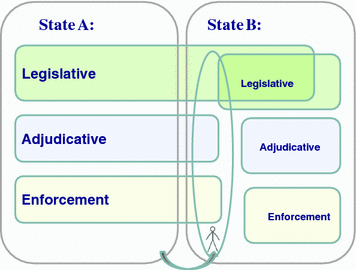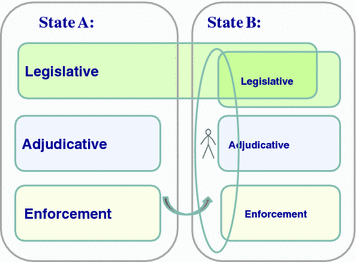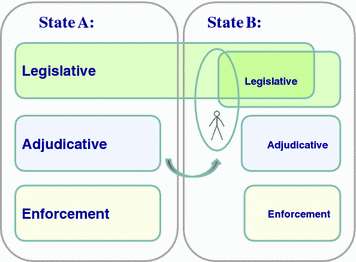Introduction

Fig. 1.1
State jurisdiction
On the basis of generally accepted principles of jurisdiction under international law, a State can extend its law to apply to persons or activities outside its own territory. In this way, the State extends its legislative jurisdiction beyond its borders. As a consequence, that State can prosecute acts committed by its nationals abroad, or which have an effect on its territory or legal order within certain generally accepted parameters. In that case, State A can prosecute a suspect when he is within its territory or when a court of State A renders a decision in absentia.
State A can lay down by law the authority of its courts to sit outside its own territory. However, this authority does not imply that those courts have the right to actually operate in State B and can, for example, conduct a criminal investigation. The extraterritorial exercise of the powers to adjudicate and enforce requires either the consent of the States involved, or a legal basis under international law.
In case a national of State A visits State B, he falls under the legislative, adjudicative, and enforcement jurisdiction of the latter State notwithstanding any possible extraterritorial legislative jurisdiction of his home State. If State A made use of its power to exercise extraterritorial legislative jurisdiction, this would result in the possibility that a particular act could constitute an offence under the laws of both States A and B, implying a degree of concurrent jurisdiction (see Fig. 1.2). No specific rules of precedence apply in situations like these and normally the State that is in the best position to act, for example the State, where the offence was committed and the perpetrator apprehended, will initiate criminal proceedings.


Fig. 1.2
State jurisdiction; State A’s national abroad
State B has, inter alia, adjudicative and enforcement jurisdiction over the visiting national from State A, except when that person is a foreign State official, like a diplomat or serviceman, present on State B’s territory with its consent (see Fig. 1.3), who enjoys immunity from the adjudicative and enforcement jurisdiction of State B.49 Officials enjoying immunity remain, however, subject to the legislative jurisdiction of both State B and State A, if the latter has extended its legislative jurisdiction beyond its borders. In cases of State officials this will virtually always be the case.


Fig. 1.3
Immunity from adjudicative and enforcement jurisdiction
If a State official commits an offence abroad he will almost always be subject to the legislative jurisdiction of both States A and B. State B, however, cannot exercise enforcement and adjudicative jurisdiction vis-à-vis the official acts of the official because of immunity. In such a case it would fall to State A to do so once the official is back home.
Immunity is attached regardless whether or not State A decides to exercise its adjudicative jurisdiction over the official upon his return to State A or in absentia. In other words, immunity does not have the primary aim to enable State A to exercise its adjudicative and enforcement jurisdiction extraterritorially vis-à-vis its official abroad. However, its aim is to prevent State B from exercising those powers over the foreign official.
With regard to visiting forces present on another State’s territory the situation is different. Many SOFAs put more emphasis on the sending States’ possibility to exercise their criminal jurisdiction than on immunities granted by host States. For instance, several SOFAs state that members of the armed forces deployed abroad are subject to the exclusive jurisdiction of their respective sending States,50 thereby expressing the parties’ understanding that State A, as sending State, to the exclusion of State B, as host State, may exercise its adjudicative and enforcement jurisdiction over the servicemen. State B, therefore, refrains from exercising its adjudicative and enforcement jurisdiction over the servicemen, who thus enjoys immunity in State B (see Fig. 1.4).


Fig. 1.4
Exclusive jurisdiction in relation to immunity
In this context, jurisdiction and immunity are closely interlinked as the report resulting from the experiences of the United Nations Emergency Force (UNEF) in Egypt shows (see Sect. 4.3.2). In the report, the Secretary-General of the UN stated that the members of the force “should be immune from the criminal jurisdiction of the host State” and that the SOFA “accordingly provided that members of the Force should be under the exclusive jurisdiction of their respective national. States with regard to any criminal offences committed by them in Egypt”.51 In 2004 the Office of Legal Affairs stated that forces participating in UN operations:
are …subject to the exclusive criminal jurisdiction of their respective national authorities, and so enjoy absolute and complete immunity from legal criminal process in States hosting peacekeeping operations.52
In the literature the relation between jurisdiction and immunity vis-à-vis military forces is not subject to debate and often the exclusive criminal jurisdiction of the sending States over their armed forces is almost naturally equated with the criminal immunity of these forces.53
In my opinion, emphasising the sending States’ jurisdiction rather than the immunity granted by host States highlights the special relation between sending States, on the one hand, and their armed forces in the execution of their mission abroad, on the other. The military force functioning as an organised entity under single military command is a necessity for mission accomplishment. This means that sending States must be able to exert their authority and command over the forces without host State interference, which requires the forces’ immunity from the jurisdiction of the host States and, above all, that sending States can exercise their jurisdiction over servicemen who have violated sending State and host State law. In other words, the military function requires that forces deployed abroad remain to a certain extent subject to the jurisdiction of the sending States and that the host States partly refrain from the exercise of these powers.
If State B refrains from exercising its adjudicative and enforcement jurisdiction over the serviceman from State A, State A in turn could waive the immunity the serviceman enjoys. This means that State B could initiate criminal proceedings instead. However, if the forces are subject to the exclusive criminal jurisdiction of the sending States, it rarely happens that these States waive their forces’ immunity.54
1.4.5 SOFAs
International practice shows that there is a preference for setting out status of forces arrangements in international agreements, which mostly take the form of treaties in accordance with the Vienna Convention on the Law of Treaties.55 However, other instruments are also used. For instance, in 2003 during the occupation of Iraq by US and British forces, the Coalition Provisional Authority of Iraq unilaterally adopted an order that regulated the conditions for the presence of foreign forces.56 With the consent of the Iraqi authorities this order continued to be in force long after the period of occupation had ended. Furthermore, States sometimes lay down the status of forces in other instruments than legally binding international agreements that are often referred to as Memoranda of Understanding (MOU).57 In addition, in several cases the UN Security Council (provisionally) dealt with the status of forces by resolution.58 This book will refer to all these instruments with the generic term SOFA. Besides, rules on the status of forces are also partly of a customary nature, as will be discussed below.
SOFAs are to be distinguished from agreements that lay down the legal basis for the visits of foreign forces. In Part III of this book these latter agreements will be referred to as visiting forces agreements.
1.4.6 Definition
In the literature SOFAs are discussed in rather general terms avoiding the need to define them.59 For the purpose of this book I propose the following definition:
A SOFA is an arrangement, no matter in what form, delineating the legal status of servicemen from a sending State who stay with the consent of the host State on its territory, and that at least includes rules on the exercise of criminal jurisdiction over the sending State’s servicemen.
The definition includes some specific elements. First, host States have to consent to the presence of the foreign military forces. Consent does not necessarily have to be part of the SOFA itself, but can precede it, for example, in a visiting forces agreement. Second, key to SOFAs is the provision on the exercise of criminal jurisdiction over the servicemen deployed abroad. Third, SOFAs normally do not deal with military personnel exclusively, but address the status of other categories as well, for example civilian personnel employed by the armed forces, and family members or civilian contractors working for the armed forces. As this book focuses on the military, other categories are left out of the proposed definition. Finally, the form of the SOFA is of less importance and the arrangement could be laid down in a treaty, MOU, or other international, multilateral or unilateral, instrument.
References
Advisory Committee on Issues of Public International Law (2001) Advisory report on immunity of foreign State officials. Advisory Report no. 20, The Hague. cms.webbeat.net/ContentSuite/upload/cav/doc/cavv-report-nr-20-immunity_foreign_officials.pdf. Accessed Nov 2014
Aust A (2007) Modern treaty law and practice. Cambridge University Press, CambridgeCrossRef
Borch FL (2001) Judge advocates in combat: army lawyers in military operations from Vietnam to Haiti. Office of the Judge Advocate General and Center of Military History United States Army, Washington
Bothe M, Dörschel T (2003) The UN peacekeeping experience. In: Fleck D (ed) The handbook of the law of visiting forces. Oxford University Press, Oxford, pp 487–506
Brownlie I (2008) Principles of public international law. Oxford University Press, Oxford
Cathcart B (2010) Command and control in military operations. In: Gill TD, Fleck D (eds) The handbook of international law of military operations. Oxford University Press, New York, pp 235–244
Conderman PJ (2013) Status of armed forces on foreign territory agreements (SOFA). In: Max Planck encyclopedia of public international law. www.mpepil.com. Accessed Nov 2014
Dinstein Y (2009) The international law of belligerent occupation. Cambridge University Press, CambridgeCrossRef
Ducheine PAL (2008) Krijgsmacht, geweldgebruik & terrorismebestrijding. Een onderzoek naar juridische aspecten van de rol van strijdkrachten bij de bestrijding van terrorisme. Wolf Legal Publishers, Nijmegen
Ducheine PAL (2010) De status van aanwijzingen van buitenlandse commandanten bij de beoordeling van functioneel militair geweldgebruik, Een reactie op de bijdrage van mr. A.F. Vink over de Tactical Directive. Militair Rechtelijk Tijdschrift 103:86–91
Engdahl O (2007) Protection of personnel in peace operations: the role of the safety convention against the background of general international law. Martinus Nijhoff Publishers, LeidenCrossRef
Fleck D (2003) (ed) The handbook of the law of visiting forces. Oxford University Press, Oxford
Fox H (2008) The law of state immunity. Oxford University Press, Oxford
Gill TD (2006) Voordracht ter gelegenheid van de oprichting van de Gezamenlijke Militaire Juridische Dienst. Militair Rechtelijk Tijdschrift 99:184–189
Gill TD, Fleck D (2010) The handbook of international law of military operations. Oxford University Press, New York